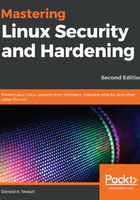
Limiting the user's actions with commands
Let's say that you create a sudo rule so that Sylvester can use the systemctl command:
sylvester ALL=(ALL) /usr/bin/systemctl
This allows Sylvester to have full use of the systemctl features. He can control daemons, edit service files, shut down or reboot, and carry out every other function that systemctl does. That's probably not what you want. It would be better to specify what systemctl functions that Sylvester is allowed to do. Let's say that you want him to be able to control just the Secure Shell service. You can make the line look like this:
sylvester ALL=(ALL) /usr/bin/systemctl * sshd
Sylvester can now do everything he needs to do with the Secure Shell service, but he can't shut down or reboot the system, edit other service files, or change systemd targets. But what if you want Sylvester to do only certain specific actions with the Secure Shell service? Then you'll have to omit the wildcard and specify all of the actions that you want Sylvester to do:
sylvester ALL=(ALL) /usr/bin/systemctl status sshd, /usr/bin/systemctl restart sshd
Now, Sylvester can only restart the Secure Shell service or check its status.
Also, be aware that some system services have different names on different Linux distributions. On Red Hat and CentOS systems, the Secure Shell service is sshd. On Debian/Ubuntu systems, it's just plain ssh.